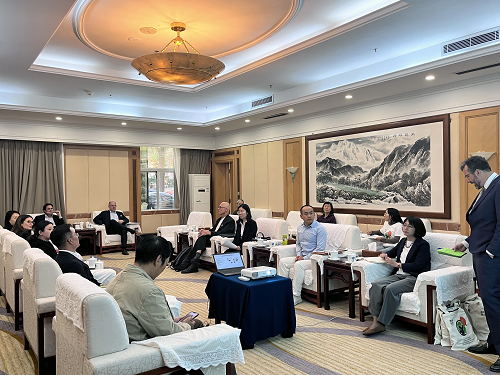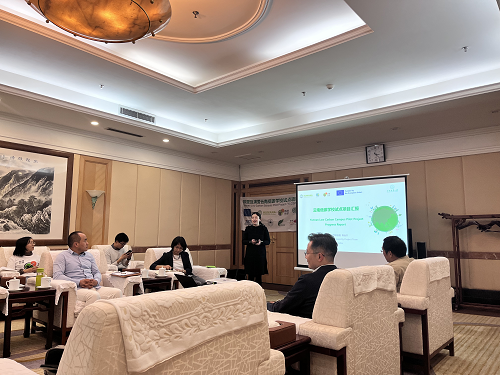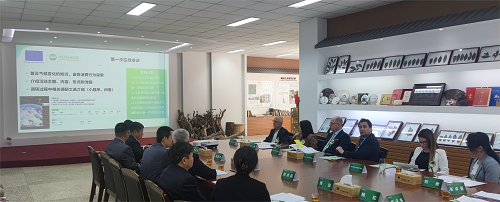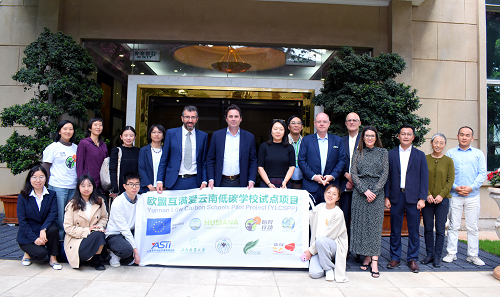Home \ Low Carbon School Pilot Project \ EU Delegation visits Yunnan Low-carbon schools pilot project
Author: Hu Yan, Partnership office
On March 24, 2023, H.E. EU Ambassador to China Jorge Toledo, Minister Counsellor Daniel Hachez, and Mrs. Feng Mei, Project Officer of the EU Delegation in China, held a project M&E meeting with Rafael Mas Brandis and Ana Ramos Perez from Humana People to People Spanish member FPP, Michael Hermann, Chief Representative of The Federation for Associations connected to the International Humana People to People Movement (Switzerland) Yunnan Representative Office (YNRO), and local Chinese partners of the HPP Yunnan Low Carbon Schools Pilot Project to report on the implementation and results of the project.

At the meeting, FPP, YNRO, the Biodiversity Research Institute of Southwest Forestry University, the School of Geography and Ecotourism of Southwest Forestry University, Kunming Good Deed Public Welfare Community Development Service Center, Kunming Environmental Popular Science Association (Green Kunming) and Yunnan Academy of Scientific & Technical Information introduced the overall objectives of the project, the project progress, data analysis and evaluation, etc.

On February 24, in order to learn more about the implementation of the pilot project, the EU delegation visited Xinying No. 3 Kindergarten in Panlong District and Southwest Forestry University in turn.
The two schools have been actively participating in the low-carbon school pilot project activities, playing a typical demonstration role in campus planning, hardware improvement, low-carbon corner construction, low-carbon activities, teachers and students' awareness of low-carbon environmental protection, and carbon sinks.

With the support of the European Union, NGOS, schools and government departments are working jointly to implement the Yunnan Low Carbon Schools pilot project. At the project visit, H.E. Ambassador Jorge Toledo concluded that this is a very good example of cooperation, resulting in a comprehensive complete age group (from kindergarten, primary school, middle and high school to university level) education intervention, influencing the majority of young people to actively respond to climate change and implementing the two-carbon goals.

With the support of the European Union, the EU-HPP Yunnan Low-carbon Schools Pilot Project has covered 10 districts and counties in Kunming City since its implementation in 2020. A total of 846 schools from inside and outside Yunnan Province have participated in the project to varying degrees, with a total audience of 2.2 million.
At present, through comparative analysis of sample data before and after implementation of the project, it is concluded that 76.16% of teachers and students have improved their awareness and knowledge of climate change, 86.28% of students can name three or more climate actions, and 47.24% of college students have decreased their carbon footprint. The EU-HPP Yunnan Low Carbon Schools Pilot Project has developed a systematic strategy for decarbonization of educational institutions in Yunnan Province.
Project introduction:
The Yunnan Low-carbon Schools Pilot Project is funded by the European Union and implemented by the People to People Foundation (Spanish member of HPP) in cooperation with FAIHPP (Switzerland) Yunnan Representative Office, Yunnan Academy for Science and Technical Information, Southwest Forestry University, Green Kunming (Kunming Environmental Popular Science Association) and Kunming Good Deed Public Welfare Community Development Service Center with a project cycle from January 1, 2020 to December 31, 2023. The project begins by increasing partners’ awareness and advocacy on climate change mitigation and environmental protection, and then raises climate change awareness among 600 schools, 70,000 students and teachers, determines the emission baseline through emission source calculations, and then implements emission reduction work in 50 Carbon Compliant Pioneer Schools. The project uses science, technology, innovation and other means to respond to “climate action” to accelerate environmental sustainability and promote the transition from green campuses to low-carbon and carbon-neutral campuses.

The project is funded by the European Union

This project is supported jointly by the European Union and the Humana People to People Foundation (Humana People to People Spanish member).
The opinions expressed here are those of the author and have nothing to do with the position of the funder.